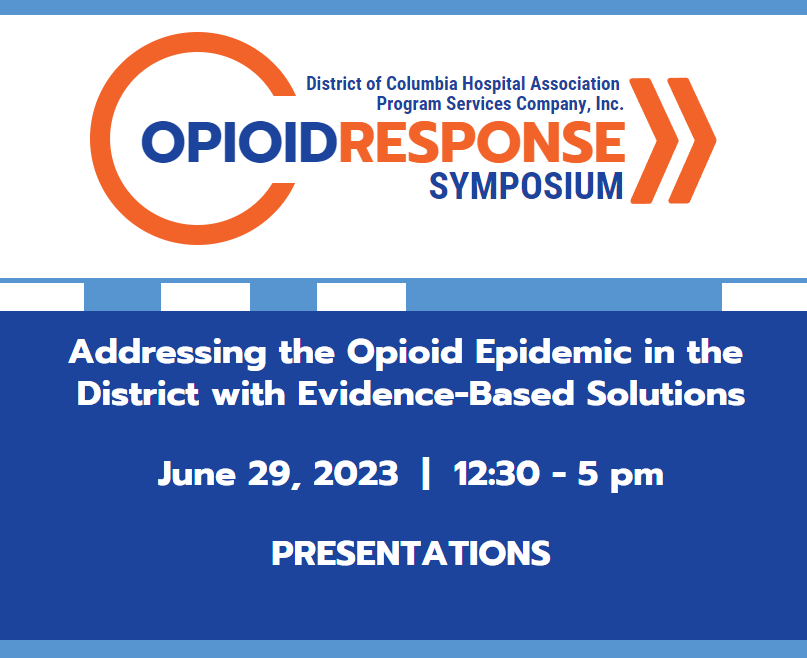2023 OPIOID RESPONSE SYMPOSIUM
The District of Columbia Hospital Association works to advance hospitals and health systems in the District by promoting policies and initiatives that strengthens our system of care.
The District of Columbia Hospital Association works to advance hospitals and health systems in the District by promoting policies and initiatives that strengthens our system of care.

The speaker will estimate the scope of the District’s opioid epidemic evidenced by data on overdoses, hospital transports, naloxone administration, and deaths; recognize key demographics of individuals who have overdosed on opioids; describe trends in opioid composition, including fentanyl levels; and outline methods the District uses for overdose and opioid surveillance.

Presenters: Kenan Zamore, MPH, Senior Research Epidemiologist, DC Health and Alexandra Evans, MFS, Senior Chemist, Forensic Chemistry Unit, DC Department of Forensic Sciences
Death and disability resulting from the use of prescription and street opioids has skyrocketed in the past 20 years, and emergency departments have seen a sharp escalation in visits related to opioid use disorder, opioid overdose, and chronic pain. This presentation will describe the fundamental principles around the prevention, identification, and treatment of patients with OUD, with an emphasis on the first-line therapy buprenorphine, which protects OUD patients from withdrawal, cravings and overdose, if effectively initiated from the ED.

Presenter: Dr. Reuben Strayer, MD, FRCPC, FAAEM, FASAM, Author of emupdates.com and Emergency Physician based in New York City
Using research-based information, this session will identify, define, and examine various aspects of creating and cultivating well-being. Neuroscience, mindfulness, metacognition, and growth mindset will act as the foundational principles. Using L.D. Fink’s integrated learning experiences/processes, each participant will begin, and hopefully finish, the process of creating their own personal well-being mind map.

Presenter: Cindy Pavell, MS, Exercise Science & Health, Milken Institute School of Public Health, The George Washington University
Our attitudes as clinicians are informed by our histories and politics – our attitudes towards drug use are informed by 100 years of the War on Drugs. This presentation will review historical evolution of policies restricting drug use, our ability to treat people with substance use disorders, and how our attitudes towards our clinical practices have been informed by social and legal factors other than evidence-based best practice. We will review the evidence and philosophical underpinning of adopting a patient-centered harm reduction framework to advance the health and well-being of people who use drugs and discuss ways to implement harm reduction principles into your clinical practice.

Presenter: Laura Haselden, MD, MPM, Emergency Physician and Senior Health Policy Fellow, Georgetown Emergency Medicine
This activity is sponsored by the State Opioid Response Grant through the District of Columbia Department of Behavioral Health.
Stay Connected
Sign-Up for DCHA News Weekly Communications

1152 15th Street
Suite 900
Washington DC
20005
